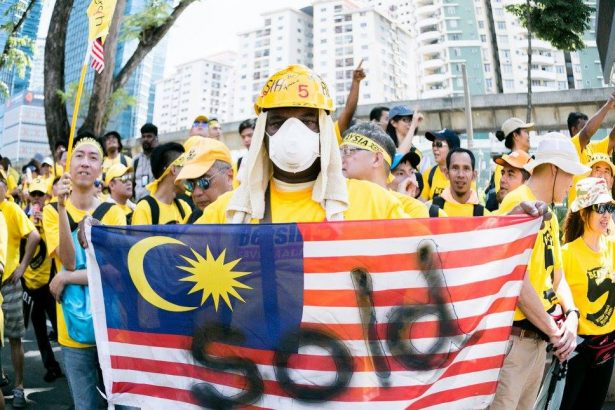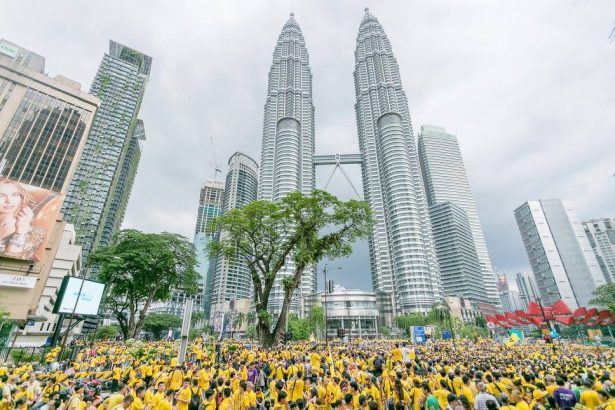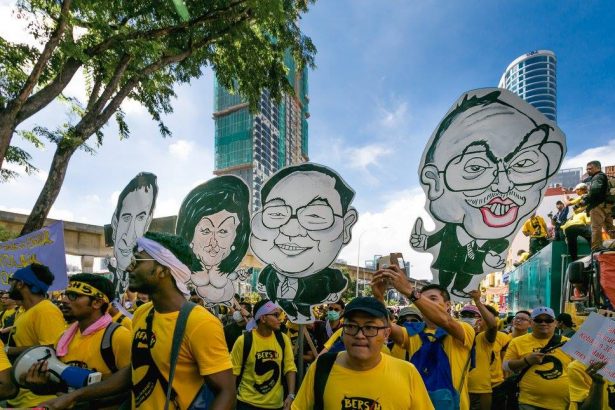
The fifth and last round of mass street demonstrations in Malaysia organized by the Bersih movement took place almost two years ago. Bersih, meaning “clean” in Malay, is a movement demanding clean and fair elections. During the Bersih 5 demonstrations, thousands of Malaysians from different backgrounds came together under the slogan “Satukan tenaga Malaysia baru,” or “Stand united for new Malaysia,” to demand electoral reform. This rallying cry for change was in some ways answered during the recent historic elections held on May 9, and the movement continues to reshape Malaysian politics today.
For the first time since the founding of the country, the longtime governing coalition, the Barisan National, or National Front, lost to the opposition coalition, the Pakatan Harapan, or Alliance of Hope. The win was particularly surprising given the many malpractices that was put in place to favor the National Front, such as gerrymandering, vote-buying and manipulation of the electoral roll. Malaysia continues to rank near the bottom internationally on perceptions of electoral integrity according to the Electoral Integrity Project, which monitors electoral conduct worldwide.
In spite of the corruption that marred the elections, the win for the Alliance of Hope marked a momentous shift in the political landscape of Malaysia towards democratic principles. With a voter turnout of 83 percent, Malaysians peacefully overthrew a corrupt regime in favor of a new governing party that promised change. While the outcome of the elections may not be surprising — given the role of Bersih — years of mobilization have paved the way for the many democratic changes taking place today.
The role of Bersih in fostering solidarity
The Bersih movement was formed over a decade ago in response to pervasive political corruption. While the movement first emerged among civil society leaders, members of various non-governmental organizations and opposition political parties, it has grown to become a non-partisan people’s movement championing social change. In 2010, the movement — led by a broad coalition of non-governmental organizations — was revamped as the Coalition for Clean and Fair Elections, but it is more commonly known as BERSIH 2.0.
BERSIH 2.0 is currently endorsed by over 92 non-governmental organizations, serving a range of causes from human rights to press freedom to youth empowerment to progressive religious values. BERSIH 2.0 has a steering committee that carries out its day-to-day tasks and organizes various efforts, such as voter registration drives, social media campaigns, election observation, legal action, lobbying and street demonstrations.

The Bersih movement has provided a platform for multiple groups to come together for a common cause, including those from different racial, ethnic and religious backgrounds. As a multicultural country, race-based politics have long been divisive. Malaysia is currently home to over 30 million people, including Malays and indigenous groups (62 percent), Chinese (21 percent), Indians (6 percent) and others (11 percent). After the country’s independence from British colonial rule in 1957, most Chinese and Indian immigrants were naturalized as citizens. However, it was written into the federal constitution that Malays and other indigenous groups would retain a special political status within the country as bumiputeras, or “sons of the soil.” Thus, the multicultural solidarity observed on the streets during all five Bersih protests is in sharp contrast to the racial division that often influences the country’s political landscape.
Mobilizations leading up to the elections
The days leading up to the elections saw grassroots mobilization by many Malaysian citizens to uphold their constitutional right to vote. From the outset, the elections were tainted with undemocratic practices that discouraged voter turnout. The elections were called within a very short time frame, with a campaign period of only 11 days. Many also criticized the decision to hold polling day during the work week. These practices made it particularly difficult for citizens who lived out-of-state or overseas to make it back to their constituencies in time to vote.
To support others who needed to travel back to their hometown in time for polling day, Malaysians created various grassroots efforts online. Crowd-funding initiatives raised money to offer free bus rides and help subsidize flight tickets. Twitter hashtags, including #CarpoolGE14, were used to help people carpool with others who were driving in the same direction. Web platforms such as UndiRabu.com (Wednesday’s vote) and PulangMengundi.com (Return to Vote) systematically coordinated the distribution of public donations to citizens who lacked the financial resources to travel.
For Malaysians living abroad who could not return to their constituency to vote, the other option was to use a postal ballot. However, many were disenfranchised because they had received their postal ballots late from the Electoral Commission, which made it impossible to mail back their vote in time to be counted. Using a Facebook group called “GE14: Postal Voters Discussion,” a group of Malaysians took it upon themselves to coordinate and send home their votes with the help of volunteers who were flying back to Malaysia for polling day.
These remarkable grassroots actions were acts of resistance by ordinary Malaysians against a tyrannical and repressive regime that tried to tip the elections in its favor. While these actions were not explicitly led by Bersih itself, they did carry the spirit and mission of Bersih: empowering people to vote and participate in the political process. These efforts helped ensure that the voice of Malaysians was heard loud and clear through the ballot. Finally, at almost 5 a.m. on the day after polling, the results of the elections were officially announced: the Alliance of Hope had won 113 out of 222 seats in parliament, securing a simple majority.
Changes under the new government
Since the elections, vast changes have occurred within the government. Notably, the Alliance of Hope government has re-opened investigations into a multi-million dollar scandal involving high-profile politicians, including the former Prime Minister Najib Razak and his wife, Rosmah Mansor. Their houses have been raided and their possessions, which were allegedly purchased with fraudulent funds, have been confiscated. Both have been charged in court for corruption. Demanding the resignation of Najib was one of the key demands of Bersih over the last few years when it became clear that he was embroiled in corruption.

Another key change was the release of Anwar Ibrahim from prison. A leader of the Reformasi (or Reforms) movement against the National Front back in 1998, Anwar was subsequently sacked from his position as deputy prime minister by then Prime Minister Mahathir Muhamad. Anwar was jailed for sodomy twice — once from 1998-2004 and again in 2015. His arrests have been heavily criticized for being politically motivated and a violation of human rights. In a surprising turn of events, for the recent elections, an unlikely alliance between Mahathir and Anwar was formed with a common goal of defeating Najib and his regime. Mahathir ran as the chairperson of the Alliance of Hope, and Anwar was the de-facto leader while still in prison. Since the elections, Mahathir has returned to serve as the prime minister once more, and Anwar has now re-entered politics by winning a seat in parliament.
Politicians and public service officers who have either failed to counter corruption or have actively participated in it are gradually being replaced under the new Alliance of Hope government. For instance, a new chairperson of the Election Commission and a new attorney general have been appointed. Bersih has supported and backed both of these appointments and continues to push for new faces within the government that have a track record of championing democratic principles.
In the hopes of strengthening the democratic processes within the country, the new government has also created an Institutional Reform Committee comprised of prominent legal advisors. In the past, BERSIH 2.0 made multiple attempts to communicate with the government, but to no avail. Now, Bersih is playing a key role in instituting reforms within the government. BERSIH 2.0 has submitted an electoral reform action plan that lays out concrete steps for revamping the electoral and parliamentary institutions.
There have also been many changes within the Bersih movement. The former chairperson of BERSIH 2.0, Maria Chin Abdullah, resigned to run in the general elections and now serves as a member of parliament. The deputy chairperson, Shahrul Aman Mohd Saari, who then took over as the acting chairperson, has just announced his resignation from BERSIH 2.0 to serve as a press secretary to the minister of education. Last week, BERSIH 2.0 elected a new chairperson and steering committee that will lead the movement through 2020.
A new Malaysia
It may appear that the political landscape of Malaysia changed overnight following the election outcome on May 9. However, the groundwork was being laid for years. Since 2007, the Bersih movement has not only mobilized people into the streets, it has also educated the public about mass corruption, increased awareness of democratic principles, encouraged voters to exercise their rights and trained ordinary citizens to become diligent election observers.
In a nationally representative survey carried out by the Merdeka Center, an opinion research firm in Malaysia, 1,160 registered voters in Malaysia reported their attitudes toward the new Alliance of Hope government in its first 100 days in power. The survey found that 82 percent were satisfied with the election outcome, and 72 percent were satisfied with efforts to reform government institutions. Satisfaction with the Alliance of Hope government was found even among people who did not vote for the new governing coalition. It seems that the election outcome may have legitimized the Alliance of Hope’s fight for reforms, including measures to counter corruption.
While there are many factors that played a role in the ongoing creation of a new Malaysia, the role of Bersih is unmistakable. And the movement’s work is not done. The new government must also be held accountable. Bersih continues to speak out against electoral malpractices by the government, including those documented during the recent by-elections.
To ensure democratic processes are upheld, the role of a social movement like Bersih that monitors electoral practices cannot be understated. After all, it was the electoral process that ultimately led to the creation of a new government. This is why there will continue to be a place for Bersih. As the political climate continues to change, the role and involvement of Bersih will change with it.

What an inspiring story to read on election day, Nov. 6, in the US. And important reminder that democratic change happens when strong roots are grown and educational outreach becomes a priority.
No complacency with today’s outcome, even if there is a huge blue wave.
This further confirmation of the role of the Bersih movement is especially
welcome to the many returned Peace Corps who served in Malaysia. I worked
5 years in Sarawak for similar goals and have in the past been disheartened
by the obvious corruption. In 1964 Najib’s father welcomed us into his office
and challenged us to help release the great potential of Malaysia. It is very heartening to see it back on track via peaceful means.
A very well detailed summary on the Bersih movement in Malaysia..this was the movement eventually opened the eye of we Malaysians..on Clean Admn..for a better tomorrow..
Hemapreya..Congrats on this article for all to read n understand..Human Rights..n how it basically uplifts or ruin a country..especially.Malaysia..SSelva